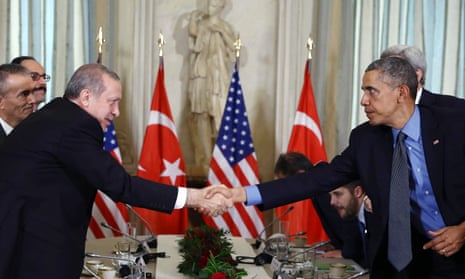US jets have resumed operations in the fight against Islamic State after being grounded for two days at an airbase in southern Turkey amid uncertainty over what the country’s failed coup might mean for bilateral ties and for the war itself.
The early signs were confusing. While Barack Obama spoke out in support of his counterpart, Recep Tayyip Erdoğan, as Friday night’s plot unfolded, dialogue since has underlined a mistrust that has plagued the fight against Isis and left two nominal allies once again struggling to find common ground.
Erdoğan’s demands that his foe, Fethullah Gülen, in self-imposed exile in the US, be extradited over claims that he drove the plot, were perceived as a slight in Washington. Officials quickly disavowed links to Gülen, demanded evidence of any connections, and rejected an implication that the US itself may have been involved.
Before the Incirlik airbase reopened, Turkish authorities arrested the base’s commander, Gen Bekir Ercan Van, and 11 other suspects, claiming they were involved in the attempted coup.
It is the latest in a series of incidents that have undermined relations between Ankara and Washington since the US-led air campaign against Isis began in late 2014.
Despite both sides claiming a mutual interest in combating the group, which had overrun large parts of Syria and Iraq and was starting to incite terror further afield, it took the US 11 months of negotiations to gain access to Incirlik, which is near the Syrian border.
Washington had made clear that the use of Incirlik would greatly aid the fight against the terrorist group. Turkey had countered that dealing with Kurds in northern Syria was just as important to its own interests. In the months since, US officials have come to believe that Turkey’s concerns about the Kurds hold primacy.
Turkish officials have railed against US moves to use Syrian Kurdish units as a proxy ground force to fight Isis and have bitterly opposed the alliance, even as it has stripped land from the group near its Syrian hub of Raqqa.
Rarely have two nominal allies been at such odds over such essential matters. To Turkey, the Syrian Kurdish cooperation has an asking price – the advancement of territorial ambitions, which it believes play directly to the restive Kurdish minority within its borders.
To the US, a failure to defeat Isis would even further destabilise the region and could pose an existential threat to its allies, especially now that the group is actively exporting chaos to Europe and beyond.
As Erdoğan continues to crack down on those he alleges were responsible for the coup and tackle other perceived threats – affecting up to 5,000 military officers and troops and close to 3,000 judges so far – Turkey’s allies are bracing for further demands from an emboldened leader.
Hard-won Turkish cooperation against Isis had begun to bear fruit in recent months, with US and allied jets now much closer to the action and able to more directly support operations led by the Kurds in north-east Syria. There, the town of Minbij, roughly halfway between Raqqa and Isis’s easternmost stronghold of al-Bab, remains under attack. Its fall would cut a key supply line, tightening the noose on Raqqa, as Iraqi forces edge towards Mosul.
Isis has launched four large-scale attacks on Turkish soil in the past 18 months, the most recent of which was a triple suicide bombing at Ataturk airport in Istanbul last month. Over the same period, Ankara has cracked down on those travelling to join Isis, denying suspected militants entry to the country and patrolling its 500-mile border with Syria with vigour.
The US and UK believe the attacks have brought their needs and Ankara’s closer together. But there has been no compromise on Turkish demands that the Kurds not be rewarded for their cooperation in the fight.
Concerns about Kurdish ambitions were a key factor in a detente agreed between Ankara and Moscow this month, after an eight-month standoff which followed the Turkish downing of a Russian fighter over northern Syria. Turkey had accused Russian jets of bombing its allies fighting the Assad regime inside Syria, and the feud seemed unlikely to be solved soon.
However, both sides share a common view – that Syria’s territorial integrity should not be compromised by whatever emerges from the ruins. According to Turkish officials, Erdoğan has also calculated that Vladimir Putin has more capacity to deliver outcomes in Syria and the broader region than the outgoing Obama, who has defined US interests through a narrow prism of defeating Isis.
Before the failed coup, Erdoğan believed he was close to being alone in the fight against Assad – and stone-cold alone with his concerns about the Syrian Kurds. He has now found an ally in the latter cause and, empowered by popular support, appears to be in a stronger position to demand cooperation on the former.
